- Home
- Sherman Alexie
The Lone Ranger and Tonto Fistfight in Heaven Page 17
The Lone Ranger and Tonto Fistfight in Heaven Read online
Page 17
“I dreamed about you the other night,” I said to Norma the next time I saw her. I told her about the dream.
“I don’t know what that means,” she said. “I hope it’s nothing bad.”
“Maybe it just means I have a crush on you.”
“No way,” she said and laughed. “I’ve seen you hanging around with that Nadine Moses woman. You must have been dreaming about her.”
“Nadine don’t know how to ride a horse,” I said.
“Who said anything about horses?” Norma said, and we both laughed for a good long time.
Norma could ride horses like she did live one hundred years ago. She was a rodeo queen, but not one of those rhinestone women. She was a roper, a breaker of wild ponies. She wrestled steers down to the ground and did that goofy old three-legged knot dance. Norma just wasn’t quite as fast as some of the other Indian cowboys, though. I think, in the end, she was just having a good time. She’d hang with the cowboys and they’d sing songs for her, 49er songs that echoed beyond the evening’s last campfire.
Norma, I want to marry you
Norma, I want to make you mine
And we’ll go dancing, dancing, dancing
until the sun starts to shine.
Way yah hi yo, Way yah hi yo!
Some nights Norma took an Indian cowboy or a cowboy Indian back to her tipi. And that was good. Some people would have you believe it’s wrong, but it was two people sharing some body medicine. It wasn’t like Norma was out snagging for men all the time. Most nights she just went home alone and sang herself to sleep.
Some people said that Norma took a woman home with her once in a while, too. Years ago, homosexuals were given special status within the tribe. They had powerful medicine. I think it’s even more true today, even though our tribe has assimilated into homophobia. I mean, a person has to have magic to assert their identity without regard to all the bullshit, right?
Anyhow, or as we say around here, anyhoo, Norma held on to her status within the tribe despite all the rumors, the stories, the lies and jealous gossip. Even after she married that James Many Horses, who told so many jokes that he even made other Indians get tired of his joking.
The funny thing is that I always thought Norma would end up marrying Victor since she was so good at saving people and Victor needed more saving than most anybody besides Lester FallsApart. But she and Victor never got along, much. Victor was kind of a bully in his younger days, and I don’t think Norma ever forgave him. I doubt Victor ever forgave himself for it. I think he said I’m sorry more than any other human being alive.
I remember once when Norma and I were sitting in the Powwow Tavern and Victor walked in, drunker than drunk.
“Where’s the powwow?” Victor yelled.
“You’re in the Powwow,” somebody yelled back.
“No, I don’t mean this goddamn bar. I mean, where’s the powwow?”
“In your pants,” somebody else yelled and we all laughed.
Victor staggered up to our table.
“Junior,” he asked. “Where’s the powwow?”
“There ain’t no powwow going on,” I said.
“Well,” Victor said. “Somebody out in the parking lot kept saying powwow. And you know I love a good goddamn powwow.”
“We all love a good powwow,” Norma said.
Victor smiled a drunk smile at her, one of those smiles only possible through intoxication. The lips fall at odd angles, the left side of the face is slightly paralyzed, and skin shines with alcohol sweat. Nothing remotely approaching beauty.
“I’m going to go find the goddamn powwow,” Victor said then and staggered out the door. He’s on the wagon now but he used to get so drunk.
“Good luck,” Norma said. That’s one of the strangest things about the tribal ties that still exists. A sober Indian has infinite patience with a drunk Indian, even most of the Indians who have completely quit drinking. There ain’t many who do stay sober. Most spend time in Alcoholics Anonymous meetings, and everybody gets to know the routines and use them on all occasions, not just at A.A. meetings.
“Hi, my name is Junior,” I usually say when I walk into a bar or party where Indians have congregated.
“Hi, Junior,” all the others shout in an ironic unison.
A few of the really smart-asses about the whole A.A. thing carry around little medals indicating how long they’ve been continuously drunk.
“Hi, my name is Lester FallsApart, and I’ve been drunk for twenty-seven straight years.”
Norma didn’t much go for that kind of humor, though. She laughed when it was funny but she didn’t start anything up. Norma, she knew all about Indian belly laughter, the kind of laughter that made Indians squeeze their eyes up so tight they looked Chinese. Maybe that’s where those rumors about crossing the Bering Bridge started. Maybe some of us Indians just laughed our way over to China 25,000 years ago and jumpstarted that civilization. But whenever I started in on my crazy theories, Norma would put her finger to my lips really gently.
“Junior,” she would say with gentleness and patience. “Shut the fuck up.”
Norma always was a genius with words. She used to write stories for the tribal newspaper. She was even their sports reporter for a while. I still got the news clipping of a story she wrote about the basketball game I won back in high school. In fact, I keep it tucked in my wallet and if I get drunk enough, I’ll pull it out and read from it aloud, like it was a goddamn poem or something. But the way Norma wrote, I guess it was something close to a poem:
Junior’s Jumpshot Just Enough for Redskin Win
With three seconds left on the clock last Saturday night and the Springdale Chargers in possession of the ball, it looked like even the Wellpinit Redskins might have to call in the United States Cavalry to help them win the first game of this just-a-baby basketball season.
But Junior Polatkin tipi-creeped the Chargers by stealing the inbounds pass and then stealing the game away when he hit a three-thousand-foot jumper at the buzzer.
“I doubt we’ll be filing any charges against Junior for theft,” Tribal Chief of Police David WalksAlong said. “This was certainly a case of self-defense.”
People were gossiping all around the rez about Junior’s true identity.
“I think he was Crazy Horse for just a second,” said an anonymous and maybe-just-a-little-crazy-themselves source.
This reporter thinks Junior happened to be a little lucky so his new Indian name will be Lucky Shot. Still, luck or not, Junior has earned a couple points more on the Warrior Scale.
Whenever I pull that clipping out with Norma around, she always threatens to tear it up. But she never does. She’s proud of it, I can tell. I’d be proud, too. I mean, I’m proud I won that game. It was the only game we won that year. In fact, it was the only game the Wellpinit Redskins won in three years. It wasn’t like we had bad teams. We always had two or three of the best players in the league, but winning wasn’t always as important as getting drunk after the game for some and for going to the winter powwows for others. Some games, we’d only have five players.
I always wished we could have suited Norma up. She was taller than all of us and a better player than most of us. I don’t really remember her playing in high school, but people say she could have played college ball if she would’ve gone to college. Same old story. But the reservation people who say things like that have never been off the reservation.
“What’s it like out there?” Norma asked me when I came back from college, from the city, from cable television and delivered pizza.
“It’s like a bad dream you never wake up from,” I said, and it’s true. Sometimes I still feel like half of me is lost in the city, with its foot wedged into a steam grate or something. Stuck in one of those revolving doors, going round and round while all the white people are laughing. Standing completely still on an escalator that will not move, but I didn’t have the courage to climb the stairs by myself. Stuck in an elevator between
floors with a white woman who keeps wanting to touch my hair.
There are some things that Indians would’ve never invented if given the chance.
“But the city gave you a son,” Norma said, and that was true enough. Sometimes, though, it felt like half a son because the city had him during the week and every other weekend. The reservation only got him for six days a month. Visitation rights. That’s how the court defined them. Visitation rights.
“Do you ever want kids?” I asked Norma.
“Yeah, of course,” she said. “I want a dozen. I want my own tribe.”
“You’re kidding.”
“Kind of. Don’t know if I want to raise kids in this world. It’s getting uglier by the second. And not just on the reservation.”
“I know what you mean,” I said. “You see where two people got shot in the bus station in Spokane last week? In Spokane! It’s getting to be like New York City.”
“New York City enough.”
Norma was the kind of person who made you honest. She was so completely honest herself that you couldn’t help it. Pretty soon I’d be telling her all my secrets, the bad and good.
“What’s the worst thing you ever did?” she asked me.
“Probably that time I watched Victor beat the shit out of Thomas Builds-the-Fire.”
“I remember that. I’m the one who broke it up. But you were just a kid. Must be something worse than that.”
I thought about it awhile, but it didn’t take me long to figure out what the worst thing I ever did was.
It was at a basketball game when I was in college. I was with a bunch of guys from my dormitory, all white guys, and we were drunk, really drunk. The other team had this player who just got out of prison. I mean, this guy was about twenty-eight and had a tough life. Grew up in inner-city Los Angeles and finally made it out, made it to college and was playing and studying hard. If you think about it, he and I had a whole lot in common. Much more in common than I had with those white boys I was drunk with.
Anyway, when that player comes out, I don’t even remember his name or maybe I don’t want to remember it, we all start chanting at him. Really awful shit. Hateful. We all had these big cards we made to look like those GET OUT OF JAIL FREE cards in Monopoly. One guy was running around in a black-and-white convict shirt with a fake ball-and-chain. It was a really bad scene. The local newspaper had a big write-up. We even made it into a People Magazine article. It was about that player and how much he’d gone through and how he still had to fight so much ignorance and hate. When they asked him how it felt during that game where we all went crazy, he said, It hurt.
After I told Norma that story, she was quiet for a long time. A long time.
“If I drank,” she said, “I would be getting drunk right about now because of that one.”
“I’ve gotten drunk on it a few times.”
“And if it still bothers you this much now,” Norma said, “then think how bad that guy feels about it.”
“I think about him all the time.”
After I told Norma that story, she treated me differently for about a year. She wasn’t mean or distant. Just different. But I understood. People can do things completely against their nature, completely. It’s like some tiny earthquake comes roaring through your body and soul, and it’s the only earthquake you’ll ever feel. But it damages so much, cracks the foundations of your life forever.
So I just figured Norma wouldn’t ever forgive me. She was like that. She was probably the most compassionate person on the reservation but she was also the most passionate. Then one day in the Trading Post she walked up to me and smiled.
“Pete Rose,” she said.
“What?” I asked, completely confused.
“Pete Rose,” she repeated.
“What?” I asked again, even more confused.
“That’s your new Indian name,” she said. “Pete Rose.”
“Why?”
“Because you two got a whole lot in common.”
“How?”
“Listen,” Norma said. “Pete Rose played major league baseball in four different decades, has more hits than anybody in history. Hell, think about it. Going back to Little League and high school and all that, he’s probably been smacking the ball around forever. Noah probably pitched him a few on the Ark. But after all that, all that greatness, he’s only remembered for the bad stuff.”
“Gambling,” I said.
“That ain’t right,” she said.
“Not at all.”
After that, Norma treated me the same as she did before she found out what I did in college. She made me try to find that basketball player, but I didn’t have any luck. What would I have told him if I did find him? Would I just tell him that I was Pete Rose? Would he have understood that?
Then, on one strange, strange day when a plane had to emergency land on the reservation highway, and the cooler in the Trading Post broke down and they were giving away ice cream because it would’ve been wasted, and a bear fell asleep on the roof of the Catholic church, Norma ran up to me, nearly breathless.
“Pete Rose,” she said. “They just voted to keep you out of the Hall of Fame. I’m sorry. But I still love you.”
“Yeah, I know, Norma. I love you, too.”
WITNESSES, SECRET AND NOT
IN 1979 I WAS just learning how to be thirteen. I didn’t know that I’d have to keep thinking about it until I was twenty-five. I thought that once I figured out thirteen, then it was history, junk for the archaeologists to find years later. I thought it would keep working that way, figuring out each year as it came, then discarding it when the new one came along. But there’s much more to the whole thing. I mean, I had to figure out what it meant to be a boy, a man, too. Most of all, I had to find out what it meant to be Indian, and there ain’t no self-help manuals for that last one.
And of course, I had to understand what it meant when my father got a phone call one night out on the reservation.
“Who’s this?” my father asked when he picked the phone up. And it was the Secret Witness Program calling him from Spokane. Guess somebody turned my father’s name in to the police. Said my father might know something about how Jerry Vincent disappeared about ten years earlier.
So we had to drive into Spokane the next day, and all the way I was asking him questions like I was the family police.
“What happened to Jerry Vincent?” I asked him.
“He just disappeared. Nobody knows for sure.”
“If nobody knows what happened, then why do the police want to talk to you?”
“I was in the bar the night Jerry disappeared. Was partying a little bit with him. Guess that’s why.”
“Were you friends?”
“I guess. Yeah, we were friends. Mostly.”
We drove that way, with me asking those questions, like how Jerry looked, how he talked, the way his clothes were wrinkled all the time. My father told me all those kind of things. About Jerry’s wife, his kids. About being disappeared.
“He wasn’t the first one to disappear like that. No way,” my father said.
“Who else?” I asked.
“Just about everybody at one time or another. All those relocation programs sent reservation Indians to the cities, and sometimes they just got swallowed up. Happened to me. I didn’t see or talk to anybody from home for a couple years.”
“Not even Mom?”
“I didn’t know her back then. Anyway, one day I come hitchhiking back to the reservation and everybody tells me they heard I was dead, heard I’d disappeared. Just like that.”
“Is that what happened to Jerry?”
“No, no. But I think everybody wanted it to be that way. Everybody wanted it that way because of the way it really happened.”
“What do you mean?”
My father put both hands on the steering wheel. A good thing, too. Just then we went into a slide on the icy road. A mean slide, a 360-degree slide around the worst corner in the Reardan Canyon. Wh
y is it that car accidents take so long to happen? And they seem to get slower as you grow older? I’d been in one accident or another every year of my life. Just after I was born, my mother ran a red light and was hit broadside. I got thrown out of the car and landed in an open dumpster. Ever since that, my life has been punctuated by more accidents, all ugly and lucky. And all so slow.
Anyway, there we were, my father and I, silent as hell while the car fancydanced across the ice. At age thirteen, nobody thinks they’re going to die, so that wasn’t my worry. But my father was forty-one and that’s about the age that I figure a man starts to think about dying. Or starts to accept it as inevitable.
My father’s hands never left the wheel and he stared straight ahead, as if the world outside the window wasn’t completely revolving. He might as well have been watching television or a basketball game. It was happening. That’s all my father allowed himself to think.
But we didn’t wreck. Somehow the car turned completely around and we kept driving straight down the road as if the slide never took place. We didn’t talk about it right afterward and we don’t talk about it now. Does it exist? It’s like that idiot question about the tree falling in the woods. I’m always asking myself if a near-accident is an accident, if standing right next to a disaster makes you part of the disaster or just a neighbor.
We just kept driving. And talking.
“What happened to Jerry Vincent?” I asked.
“He got shot in the head in the alley behind the bar and they buried his body up in Manito Park.”
“Really? Do the police know that?”
“Yeah. I’ve told them quite a few times. I get called in about once a year, you know? And I always tell them the same thing. Yes, I was with Jerry that night. Yes, he was alive when I saw him last. Yeah, I know he was shot in the head in the alley behind the bar and they buried his body up in Manito Park somewhere. No, I don’t know who shot him, I just know the story because every Indian knows the story. No, I don’t know where the body is buried. No, I didn’t shoot him or bury him. I just had a few beers with him that night. Had quite a few beers with him over the years. That’s all.”

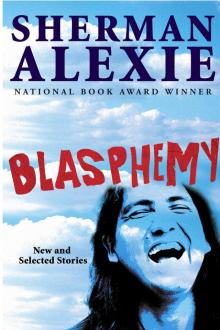 Blasphemy: New and Selected Stories
Blasphemy: New and Selected Stories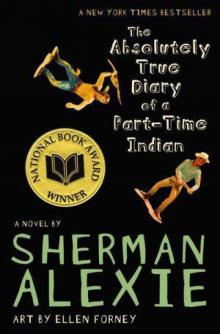 The Absolutely True Diary of a Part-Time Indian
The Absolutely True Diary of a Part-Time Indian Flight
Flight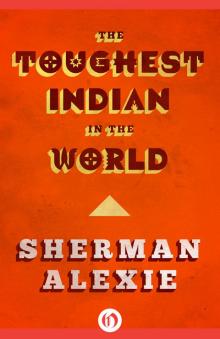 The Toughest Indian in the World: Stories
The Toughest Indian in the World: Stories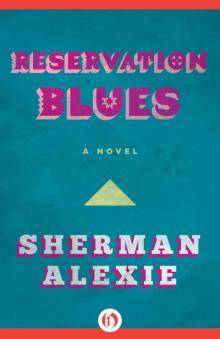 Reservation Blues
Reservation Blues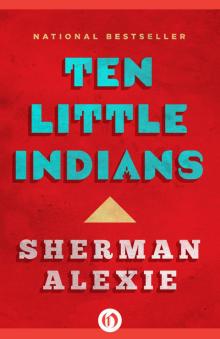 Ten Little Indians: Stories
Ten Little Indians: Stories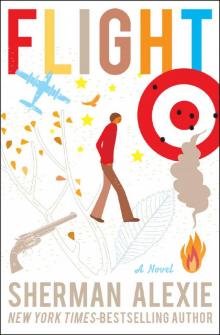 Flight: A Novel
Flight: A Novel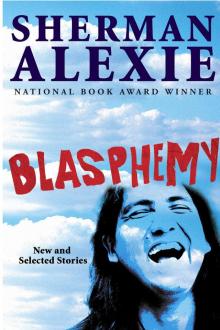 Blasphemy
Blasphemy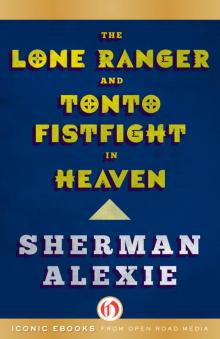 The Lone Ranger and Tonto Fistfight in Heaven
The Lone Ranger and Tonto Fistfight in Heaven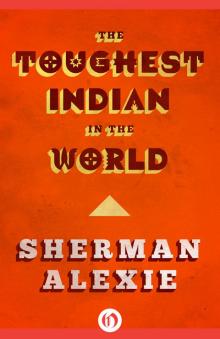 The Toughest Indian in the World
The Toughest Indian in the World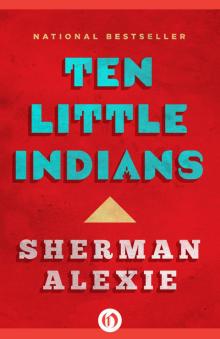 Ten Little Indians
Ten Little Indians